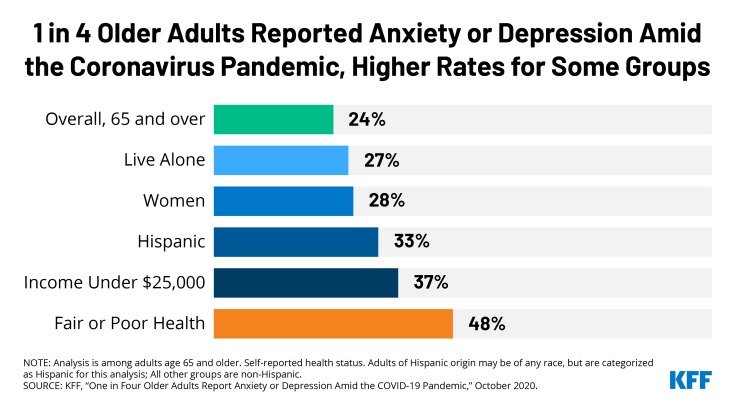Good mental health and emotional stability are extremely important for everyone, including seniors. However, their mental health needs often get neglected.

Image Source: https://www.kff.org/medicare/slide/half-of-older-adults-in-worse-health-have-reported-anxiety-or-depression-during-pandemic/
The COVID-19 virus outbreak made a significant impact on the mental health of older adults. It was mostly due to increased rates of social isolation, loneliness, and bereavement. In fact, one out of four of them were reported to have suffered from anxiety or depression during this time. They were considered at higher risk of serious illness if infected and accounted for 80% of all COVID-related deaths.
That is why the hospice process became even more important during the pandemic. It helped them in finding a sense of balance, calm, and general understanding.
Understanding Mental Health of Seniors
The mental health needs are as important as physical health needs, and they need to be addressed properly. When people think of seniors in need of hospice, they usually consider those suffering from some form of physical ailment such as a brain injury, terminal disease, or complications from a fall. These seniors certainly need attention as the physical trauma they have sustained requires medical and nursing assistance through home hospice services.
However, their mental health can also be a requirement for hospice care. It is estimated that around 6% of the general population suffers from serious persistent mental illness (SPMI). It is a chronic or recurrent condition that demands ongoing intensive medical treatment. It can significantly affect a person’s overall wellness, especially among older people.
Apart from this, there are medical conditions like Alzheimer’s disease or other psychological ailments and injuries that require hospice care for seniors. These conditions can be as severe as physical conditions and can sometimes affect their physical health as well.
Common Mental Illness Among Seniors

Image Source: https://www.psychiatrictimes.com/view/most-prevalent-psychiatric-disorder-older-adults
The National Comorbidity Survey Replication (NCS-R) found older adults (those aged 60 years or older) suffer from many mental illnesses. Among these, the prevalence of any anxiety disorder was 15.3% with specific phobia being the most prevalent (7.5%).
There are several other mental illnesses that can present among seniors in many forms, including:
- Anxiety disorders like social anxiety, panic disorders, generalized anxiety, or phobias
- Mood disorders including bipolar disorders and depression
- Psychotic disorders like hallucinations and schizophrenia
- Eating disorders such as anorexia, bulimia, or binge-eating
- Impulse control and addiction disorders (like gambling, alcohol and drug abuse)
- Personality disorders such as obsessive-compulsive disorder (OCD) and paranoid personality disorders
When taking care of the older adults, you need to be careful of any warning signs or symptoms so that proper medical attention can be provided. These warning signs include:
- Noticeable changes in mood, energy level, or appetite
- Difficulty sleeping or significant change in sleeping pattern
- Difficulty concentrating or feeling restless
- Increased anxiety or feeling stressed
- Anger, irritability, or aggressiveness
- Ongoing headaches, digestive issues, or pain
Why Hospice Care is Important for Seniors
It is estimated that one in four older adults experiences some mental disorder, like depression, anxiety, or dementia. And, with the number of seniors with mental disorders expected to double by 2030, hospice care is becoming a big concern. When seniors suffer from mental health problems, such as isolation, affective and anxiety disorders, psychosis, sleep and behavioral disorders, or cognitive deterioration, they require immediate and constant support. It makes hospice care at home a necessity for them to survive and heal.
Another reason for hospice care is that seniors with mental condition usually suffer from disrupted personal ties and loneliness. With proper care at home, they get benefit from supportive social connections and close personal relationships. If they do not get the much-needed attention, severe mental illness can negatively affect their longevity and quality of life.
What to Expect from a Hospice Team?
A hospice or 24-hour nursing care’s presence ensures that the seniors get proper support and treatment. These professionals are equipped and trained to handle most kinds of mental health issues. You should look for a qualified team that has experienced, licensed, and certified psychiatric nurses, counselors, and social workers.
You should ensure that your loved one gets care and protection from a qualified facility. They can work hand-in-hand with mental health professionals, including psychologists and psychiatrists and develop an appropriate hospice plan to support the patient.
A person’s mental health takes up a huge part of their life, especially among older adults. Mental health concerns affect the patient as well as the lives of their loved ones. That is why it is crucial to provide them with hospice and 24-hour nursing care services. It will ensure that they get adequate assistance to manage these issues.

